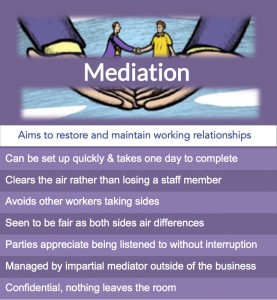There has been a dramatic increase in the numbers of claims being brought to Employment Tribunals against Employers since fees were abolished in July 2017. In January to March 2019 single claims – defined as being claims made by a sole employee against their employer for a breach of their employment rights – were running at 10,000 per quarter, compared to an average of 4,250 claims per quarter throughout 2016.
This means that single claim receipts are running at approx 40,000 per year now, compared to around 18,000 per year prior to fees being abolished.
From years of experience working alongside HR Directors and solving thousands of HR problems, we have compiled these golden rules to help you de risk your business against claims, and to put you in the strongest position to defend a claim should it arise.
# Avoid workplace claims by having good employment contracts and keep them up to date
This is a legal requirement. The penalty is up to 4 weeks pay awarded by an Employment Tribunal. Tailor the employment contracts for different staff, for example CEOs and Senior Sales Directors need Restrictive Covenants so they do not poach customers once they leave.
# Tailor your staff handbook to your business
Include all the policies you need to show to staff what is good and bad behaviour. Include for example a Social Media Policy and Data Protection Policy (or Privacy Standard) in your handbook to show what is acceptable and unacceptable use of Social Media and personal data. Set out examples of misconduct in your disciplinary policy. For more information on this, read our article on how to avoid social media misuse and protect from liability.
# Follow all UK Visa and Immigration rules
This is so important for the current Tier 2 visa programme to avoid fines of upto £20,000.
# Communicate the New Employment Laws fast and first
Communicate new employment laws to your team before they happen and before your team learn of them from other sources. It is of course easy for Staff to be right up to speed on their rights. So be pro-active, it demonstrates that your business is thinking about its people. A typical example would be introducing and explaining the new employment laws or Flexible Working policies as they become available. Here is our slideshare which explains flexible working.
We keep track of the latest changes in Employment Law, here to help you
Take advantage of these changes to prepare policies, communicate and explain these changes to your Staff.
We can keep you and your teams abreast all the new laws on the horizon and what they mean for your business before they come into force. You can subscribe to our newsletter: just click here, or in the footer below.
# Follow your formal procedures (e.g disciplinary/ grievance/ redundancy), Follow what the business states in the staff handbook and employment contracts
Employment Tribunals generally take a dim view of Employers who don’t follow their own policies. Policies are there to be used. Often an employer who simply starts without planning will get into difficulty. Most employees will obtain their own legal advice and will challenge the policy when possible. It’s critically important to get the process right. If you don’t start the process correctly from the beginning, it is very difficult to go back and start it again. Employers can and do earn respect from other staff who see them dealing with an issue properly and fairly in accordance with the policy in the handbook and with employment law.
If employers fail to follow a valid disciplinary or grievance process, an Employment Tribunal can increase the Award by upto 25%.
# Don’t be afraid to use Settlement Offers
At any time employers can make a settlement offer to an employee to leave and receive a reasonable settlement. The employee cannot refer to the settlement offer or any conversations regarding it at an Employment Tribunal. These “protected conversations” and are confidential. There is more know-how in this article which outlines the correct way to make and manage successful settlement offers.
# Avoid workplace claims by using Mediation to resolve staff problems and grievances early

Mediation is a voluntary and informal process where a trained mediator helps the employer and member of staff resolve a dispute.
Long established in family law and in commercial dispute resolution, employers are turning to Workplace Mediation as a cost effective and fast way to resolve issues between colleagues. If unresolved these dipsutes can seriously undermine their own and the employer’s performance and staff morale.
Workplace Mediation can resolve:
– personality clashes and employees at loggerheads, including issues between Senior directors and at Board level
– communication breakdowns
– relationship breakdown within a team
– bullying and harassment
– cultural misunderstandings due to different nationalities working in the same workplace.
The HR Director is not involved so remains neutral. Here is more detail explaining how Workplace Mediation can solve conflict at work and which UK companies already use it extensively.
We offer a fixed price Mediation service, at prices ranging from £950 plus VAT to £2,000 plus VAT depending upon the complexity of the situation. In our experience, effective resolution can usually be gained within a day, albeit an intensive day for those involved. Some follow up support is included and available if this becomes necessary. Mediation is much more cost effective when compared to the expense of an Employment Tribunal Case. The average legal fees of an ET case for the employer are between £15,000 and £20,000.
# Establish a transparent pay, promotion, bonus and share option structure to help avoid equal pay claims and to reward those employees who contribute
Once again, take the opportunity to outline and explain the benefits of these schemes to your teams. Explain the changes to your teams as they occur e.g in overtime and holiday pay, workplace pensions so employers can plan.
Establish enterprise management incentive (EMI) share schemes to share the value creation with key staff.
although the Gender Pay Gap laws only apply to employers with 250 or more staff this principle will influence any employer’s staff when they consider their future prospects.
# Bring an HR specialist onboard and ask us for legal advice
Hire or consult with an HR Director. Experienced HR s
pecialists see it as their role to help run the business run more effectively. Give your HR Director authority for all HR issues and make sure he/she is responsible for this area. He/she should update the CEO/CFO and Operational Directors on law changes and the action to take on HR problems so that the business acts consistently and knowledge is shared. We work closely all the time with our HR Directors to make their roles as efficient as possible and together solve HR disputes
# Make it a habit to communicate with Staff in order to avoid workplace claims
It may sound straightforward, but this practice is so often overlooked by employers. When you see a problem developing, talk with your employee(s) on an informal basis at the earliest opportunity. This stops the dispute escalating into a situation which could result in complicated and time consuming grievance, worse still an Employment Tribunal claim. Remember to keep detailed notes of every conversation however informal.
Even more golden rules to avoid workplace claims
- They may go in and out of fashion, but its good practice to have regular appraisals. Agree with the employer how regularly they take place. There are a number of elements to cover on appraisal forms and in appraisal meetings that will help protect your business from workplace claims. For more details, do get in touch; details below.
- If an employee has raised a grievance, at the first grievance meeting take the opportunity to ask the employee what is the solution that he/she wants and listen. The clue to a speedier, cleaner resolution is often revealed in the responses to this simple question. You may not be able or willing to meet the solution an employee requires, but don’t let that stop you asking. This sets a solution orientated framework and can fast track to the underlying issue and ultimately resolving the problem better. It may be the employer can propose a modified solution back to the employee which solves the grievance.
- In Stress Cases: offer confidential counselling with a trained expert.
- Know when to use an Informal Meeting and when to use a Formal Meeting.






